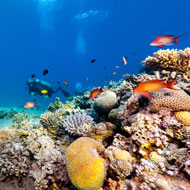Extensive marine microplastic pollution confirmed

One shower can equate to 100,000 plastic microfibres entering the ocean.
New research into marine pollution shows evidence of the ingestion of microplastic fibres by deep sea animals. Scientists working aboard the Royal Research Ship James Cook, in the mid-Atlantic and south-west Indian Oceans, have discovered microbeads inside hermit crabs, squat lobsters and sea cucumbers.
The team used a remotely operated, underwater vehicle to collect deep sea creatures living at depths of 300m and 1800m. The microfibres found inside the animals, included polyester, nylon and acrylic, and are characterised as units under 5mm in length. The plastic fibres strongly resemble ‘marine snow’- the organic material that falls from water close to the surface of the ocean and which deep sea creatures consume.
These materials enter our oceans via the washing of synthetic fabrics, showering with cosmetic products that contain microbeads and from fishing line nets.
Laura Robinson, Professor of Geochemistry at Bristol’s School of Earth Sciences, said: “This result astonished me and is a real reminder that plastic pollution has truly reached the furthest ends of the Earth.”
The research published in the journal, Scientific Reports, comes after the House of Commons Environmental Audit Committee reported on the environmental damage caused by microbeads. The committee revealed that one shower can equate to 100,000 plastic microfibres entering the ocean. Following this, the British government announced a ban on the use of plastic microbeads, by the end of 2017.
Dr Michelle Taylor, Oxford University’s Department of Zoology, and lead author of the study, said: “The main purpose of this research expedition was to collect microplastics from sediments in the deep ocean – and we found lots of them. Given that animals interact with this sediment, such as living on it or eating it, we decided to look inside them to see if there was any evidence of ingestion. What’s particularly alarming is that these microplastics weren’t found in coastal areas but in the deep ocean, thousands of miles away from land-based sources of pollution.”
Associate Professor in Forensic and Crime Science at Staffordshire University, Dr Claire Gwinnett, said: “Existing forensic approaches for the examination of fibres are tried and tested for their robustness and must stand up to the scrutiny of the courts of law. These techniques were employed in this research in order to effectively reduce and monitor contamination and therefore provide confidence in the fact that the microplastics found were ingested, and not from the laboratory or other external contaminant.
“Using forensic laboratory techniques, we have identified that microplastics are present in ingested material from deep sea creatures. Forensic science is still a fairly new science, but we are delighted that our work and techniques are starting to inform other sciences and important environmental research such as this.”
The collaborative study, sponsored by the European Research Council and the Natural Environment Research Council, involved scientists from the University of Oxford, the University of Bristol, Staffordshire University’s Forensic and Crime Science Department and the Natural History Museum.



 The veterinary mental health charity Vetlife is inviting the veterinary community to join it for a sponsored cold-water dip.
The veterinary mental health charity Vetlife is inviting the veterinary community to join it for a sponsored cold-water dip.